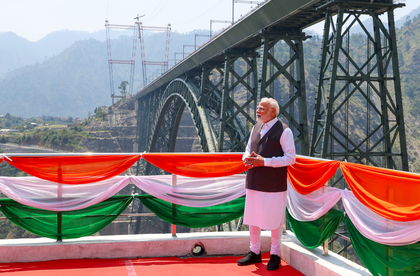J&K's massive transformation tight slap on those who justified bloodshed as resistance: Top US expert
By IANS | Updated: August 1, 2025 18:29 IST2025-08-01T18:22:10+5:302025-08-01T18:29:52+5:30
Washington, Aug 1 A renowned international analyst on Friday hailed the unprecedented development in Jammu and Kashmir, especially ...

J&K's massive transformation tight slap on those who justified bloodshed as resistance: Top US expert
Washington, Aug 1 A renowned international analyst on Friday hailed the unprecedented development in Jammu and Kashmir, especially the post-2019 transformation, stating that the massive change in a region long held hostage by instability and armed extremism is not cosmetic but foundational and denies militants the narrative they rely on.
John Spencer, Executive Director at the US-based Urban Warfare Institute, visited India recently and travelled to Jammu and Kashmir to witness first-hand how the region is "building, physically, economically, and psychologically", towards something that is not defined by violence.
"In the 2024–25 fiscal year alone, the Indian government invested over ₹10,516 crore (approximately USD 1.3 billion) into Jammu and Kashmir. That money is being turned into projects that are connecting Kashmir to the rest of India, not just metaphorically, but physically," Spencer wrote in an article titled 'The Beauty of the Developing Jammu and Kashmir' which he shared with his followers on X on Friday.
Among the most ambitious undertakings, he wrote, are the new rail and transport corridors that are knitting Kashmir into the rest of the country.
"The Chenab Railway Bridge now stands as the tallest railway arch bridge in the world at 359 meters, built at a cost of ₹35,000 crore (USD 3.7 billion). It has been called the crown jewel of the Udhampur–Srinagar–Baramulla rail line, a corridor that is reshaping the region’s economic and strategic future. Nearby, the Anji Khad Bridge, India’s first cable-stayed railway bridge, links the rugged Reasi district. In February 2024, Tunnel T-50, India’s longest rail tunnel at 12.775 kilometers, was opened, cutting through the Pir Panjal range to enable year-round movement," Spencer mentioned.
"This is not just engineering. It is statecraft in concrete and steel," he added.
The change, states the leading expert on urban warfare, happened in 2019 after India abrogated Article 370, revoking Jammu and Kashmir’s special autonomous status.
"It was a bold constitutional change, and one that many observers, especially outside India, feared would lead to greater unrest. Instead, the years that followed have brought a different reality, one defined by massive investment, record-breaking infrastructure, and the visible return of public life," said Spencer.
Roads expanded, schools were built, businesses opened and tourists returned to the Valley with more than 23 million people visiting Jammu and Kashmir in the last one year.
"What was once a symbol of insurgency is becoming a destination for families, entrepreneurs, and builders. And perhaps most importantly, Kashmiris are participating in this change. It is not something being done to them. It is something many are now doing with and for themselves," wrote Spencer.
However, the transformation had its enemies, he detailed, highlighting the heinous April 22 Pahalgam attack when terrorists from a Pakistan-based terrorist group killed 26 people and wounded at least 17 others.
"The victims were pilgrims, tourists, and local residents. The massacre shocked India, triggered a brief war with Pakistan, and briefly made international headlines. But what received far less attention was why the attack happened. It was not random. It was a strategic act of terrorism aimed at disrupting the very stability that Kashmir's development now represents. Extremist groups understand that roads, railways, tourism, and rising civilian confidence are a threat to their relevance. Violence like the Pahalgam attack is designed to halt that momentum, not through military defeat, but through fear."
Emphasising that stability is the enemy of extremism, he lauded Jammu and Kashmir's development insisting that every kilometre of new road, every new bridge, every child in a functioning school are nails in the coffin of a worldview that justifies bloodshed as resistance.
"Kashmir's natural beauty has long been undeniable. What I saw during my visit was something more powerful. A people reclaiming what was lost, and building what should never again be taken away. A home once lost is being found again. And this time, it is being made stronger than ever before," Spencer concluded.
Disclaimer: This post has been auto-published from an agency feed without any modifications to the text and has not been reviewed by an editor
Open in app